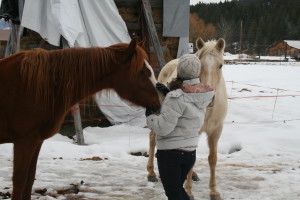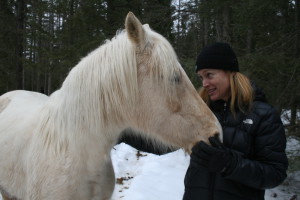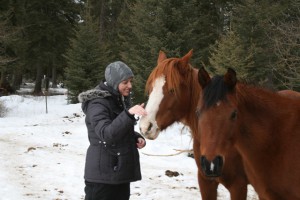 “Why horses?
“Why horses?
Naturally intimidating to many, horses are large and powerful. This creates a natural opportunity for some to overcome fear and develop confidence. Working alongside a horse, in spite of those fears, creates confidence and provides profound insight when dealing with other intimidating and challenging situations in life.
Equine Assisted Learning (EAL)
It is important to understand the the distinction between Equine Assisted Learning (EAL) and Equine Assisted Psychotherapy (EAP). A primary difference in the two fields lies in the goals of the processes and the clients being served. Clients who come with treatment goals such as substance abuse, depression, opposition, abuse or labels like at risk” or “troubled” or other terms that might indicate therapeutic goals, would be served by Equine Assisted Psychotherapy (EAP) and thus require a mental health professional. Clients with a general desire to improve themselves, their systems, or organizations may be served by Equine Assisted Learning.
EAL session do not necessarily require a mental health professional in the treatment team, yet high standards of professionalism and ethics must be maintained. We are concerned that equine assisted learning sessions are considered a viable alternative for EAP sessions; EAL sessions must be future focused and solutions based to avoid crossing over into mental health issues. All equine sessions can become intense, emotional experiences and it is imperative that facilitators are professional and have the training and experience to meet the demands of varied learning groups. EAL is a solution focused to help provide the drive and guidance for their clients need to improve their careers, relationships, and lives. It can help clients to:
- Recognize their skills and dream
- Refocus their life’s goals
- Move past challenges that stand in the way of those goals
Equine Assisted Psychotherapy
Equine Facilitated Psychotherapy (EAP) is an experiential approach to psychotherapy in which participants work one on one with horses in a variety of activities. The process includes working with horses in many different ways with the horse as your partner. As participants learn to establish trust, respect, and communicate with their equine partners, they gain the skills necessary for building strong, healthy, trusting relationships in other areas of their life. This model of therapy provides a focused interactive equine experience in which emotions can be felt and processed as they happen in a safe and fun setting. The client has the opportunity to find deeper meaning and understanding of their patterns, behaviors and themes by processing the outcome of the activity with the EAP professional team. The clients will have the opportunity to try out new behaviors and attitudes with immediate feedback from the horses’ behavior.
Horse Powered Reading
How do horses help teach reading? With EAGALA Model Equine Assisted Learning (EAL), students see and experience reading with their entire mind and body by creating metaphors for the skills involved in reading. Horses become the reading material or book students need to connect with. In a Horse Powered Reading session, reading problems may be made visible by labeling obstacles that get in the way of understanding. Clients create a “Reading Road” (obstacle course) that must be navigated with their chosen reading material (horse).
(*Horse Powered Reading ©Michele Pickel PhD Associate Professor of Education – Concordia University St, Paul PK-8 MN Teaching License with K-12 Reading Endorsement Advanced EAGALA Certified)
Please contact Bobbi for further information regarding scheduling an EAL or Horse Powered Reading session or inquire about Centered Riding Lessons or boarding your horse.